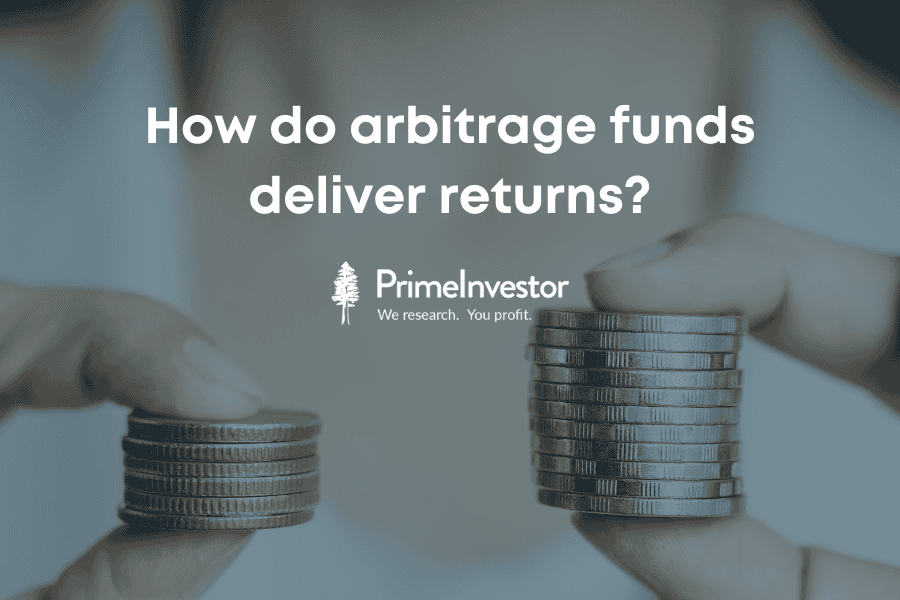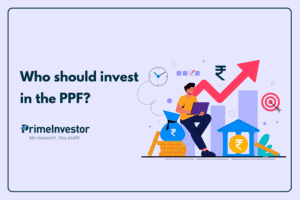Please note that mutual fund taxation has changed with effect from July 2024. Please refer to this article for updated tax rules.
With arbitrage funds averaging returns of 7.37% in the last one year (as of May 1 2024), they’ve been attracting exceptional inflows. As arbitrage funds have outperformed short-term debt categories such as overnight, money market and liquid funds (6.69% to 7.14% return), many investors are asking: Why can’t we just substitute all our debt funds with arbitrage funds?

After all, arbitrage funds also enjoy a big tax advantage over debt funds because of their being treated as equity funds. Therefore, returns on these funds are taxed at 15% for short term capital gains and 10% for long term capital gains after one year. Whereas, debt fund returns are taxed at your income tax slab rate.
(you can read more about the taxation aspect of debt funds and equity funds here: Should you replace debt funds with arbitrage funds to save tax?
While arbitrage funds do score over debt fund categories on the taxation aspect in many cases, we believe that their recent returns may not be sustainable in the long run.
How arbitrage funds work
Before explaining why, it is good to understand how arbitrage funds earn their returns. Globally, arbitraging refers to making money from any kind of mispricing or anomaly in the market. The common forms of arbitrage trading involve betting on price differentials on the same security between different markets, betting on anomalies created by corporate events such as mergers, demergers, bonuses, dividends and splits and so on.
Arbitrage funds in India however rely mainly on one kind of arbitrage, which is cash-futures arbitrage. They earn monthly spreads from the differences between the cash and futures prices of individual stocks traded in the market.
Take the example of HDFC Bank, which was trading at Rs 1515 on May 1 on the cash segment of the exchanges. However, the futures contract of HDFC Bank expiring exactly 30 days later was trading at Rs 1525 on the same day. Futures usually trade at a premium to spot prices of the same security, to account for the time value of money (except where a dividend declaration is in the picture).
An arbitrage fund would buy the HDFC Bank stock in the cash market and sell its 1-month futures contract at the same time, pocketing the difference or ‘spread’ of Rs 10 per share. This works out to a 0.66 per cent return for the month (without accounting for transaction costs etc). At the end of the month, the fund buys the futures contract and sells the stock in the cash market to square off this trade. It then repeats the same trade with the next month’s futures contract to earn this spread all over again. In practise, funds may simply rollover their positions from month to month without repeatedly transacting every month.
In the above example, if the spreads on HDFC Bank futures remain the same through the year, the fund would earn a return of 7.92% (0.66*12). In reality though, spreads do fluctuate. If spreads fall, arbitrage returns would be lower and if they rise the returns can follow suit.
This brings out three distinct features of the arbitrage strategy.
- One, returns on the strategy do not depend on the direction of the market or the movement in stock prices. In the above example, the fund would pocket its arbitrage spread of Rs 10 irrespective of whether the HDFC Bank stock moves up or down for the month. If the HDFC Bank stock were to fall to say, Rs 1500 by month-end, the fund would make a profit of Rs 25 on its sell transaction on the futures contract, but make a Rs 15 loss on its buy transaction in the cash market – the net spread it pockets will remain at Rs 10. If the stock were to rise to Rs 1530, it would make a Rs 5 loss on its futures transaction but pocket a gain of Rs 15 on the cash market transaction.
- Two, the strategy will only work with stocks that are actively traded in the futures segment. Funds limit arbitrage index futures because that would involve buying and selling an entire basket of securities at varying prices. The Indian market has futures contracts in over 180 individual stocks. But only a few dozen are actively traded and have enough liquidity for institutions to buy or sell without significantly impacting the price. This effectively forces all cash-futures arbitrageurs to trade mainly in this limited basket of stocks. As FIIs and retail investors are also active in this market besides mutual funds, the entry and exit of these investors can influence spreads.
Three, trading in the futures market entails depositing a margin with the exchanges. Therefore, arbitrage funds cannot invest 100% of their portfolio in arbitrage opportunities. They tend to hold 20-30% towards margin requirements and cash equivalents. This has a bearing on returns.
What influences returns
The above points tell us that the annual returns that arbitrage funds earn are decided by the monthly spreads available on cash-futures arbitrage. These spreads, unlike the interest from t-bills or corporate bonds (which debt funds own), can vary from month to month. Over short periods, they can also thin so much, that arbitrage funds make negative returns.
Arbitrage fund spreads can move up or down based on three factors.
#1 Short-term rates
To earn their monthly spreads, arbitrage funds need a counter-party in terms of a trader who is willing to pay a premium to buy a futures contract. This premium loosely corresponds to the short-term cost of money (interest rates) prevailing in the market. When interest rates in money markets are ruling high, arbitrage spreads rule high too. When they fall, the spreads dip too. This is why arbitrage fund returns have historically moved up or down with returns on very short-term debt fund categories such as overnight, money market and liquid funds.
#2 Appetite for leverage
Futures contract represent highly-leveraged (and therefore risky) bets on individual stocks. Therefore, the availability of arbitrage opportunities in stocks and the spreads on them are both dependent on the risk appetite of F&O traders. When markets are bullish, traders expect to make big gains and are thus willing to fork out a higher spread for futures trades.
When the market is trading sideways, they may be willing to pay a slightly lower premium in line with their return expectations. But when markets are bearish, traders may even stay off trimming the opportunities for arbitrage funds. Therefore, though arbitrage spreads are not dependent on market direction, the opportunities for arbitrage are more plentiful in bullish markets. So, if the next six months see a big market crash and an exodus of retail traders from F&O arbitrage spreads may very well shrink.
#3 Participants
Arbitrage spreads can also move up or down depending on the entry or exit of major participants from the futures segment. In the past, the entry of FIIs into arbitraging has compressed spreads, while their exit has improved spreads. FIIs may move in and out of this market based on their positions in the cash market in specific stocks and their shifting country and currency view.
Overall, therefore, while arbitrage funds may offer the potential for higher returns than liquid or money market funds when stock market conditions are favourable, their returns are also far more volatile than debt fund categories. The rolling return analysis below, of the largest arbitrage, liquid and money market fund, demonstrate this.
But one aspect on which debt funds cannot compete with arbitrage funds is friendly tax treatment. Taxation at slab rates means that investors in the 20% and above tax brackets will need to fork out 20% plus of their returns from liquid or money market funds to the taxman irrespective of their holding period. But arbitrage fund investors can take comfort from the fact that their gains will be taxed at only 15% or 10% depending on their holding period. Arbitrage funds can be preferred for this reason until the government notices and decides to plug this tax arbitrage!







16 thoughts on “How do arbitrage funds deliver returns?”
Great article Aarati ji as always!
Please correct me if my understanding is not right on the below 2 points as per the use case/s:
While Arbitrage funds hold a tax advantage over liquid funds, they fall short on 2 aspects:
1. While liquid funds would give you positive returns even on very small time durations, the Arbitrage funds are volatile and may even give a negative return over a 3 months period. So, if someone wants to substitute their liquid fund with an Arb fund, they should make sure that the goal is at least 3 to 6 months away.
2. Arb funds are also not a substitute for Liquid funds for the purpose of being a part of the Emergency corpus. One reason is the point 1 above. The second reason is that the redemption proceeds are received almost immediately (in some funds and up to some amount) in Liquid funds, whereas the Arb funds follow the equity fund timelines for getting the redemption proceeds in the investor bank account.
You are absolutely right on both counts Just one thing..we have had liquid funds suffer defaults on CPs and give negative returns in the past. But these are one-off events.
Dear Aarati Mam,
I wanted to take a moment to express my sincere appreciation for your article on the above topic.
Your writing style is captivating and engaging, making it a joy to read from start to finish. Infact I read the article 3 times to have a detailed understanding. Myself as an MFD have more clarity on Arbitrage category products now.
Thank you, Aaratiji for sharing your insights.
Regards,
Kartik Dadia
Thank you so much. Such feedback is what makes me enthusiastic about starting every new article, though I’ve been writing for 28 years!
The minimum and maximum rolling return mentioned for arbitrage sbi liquid and absl mm is for what period. 3months 6 months or 1 year.
Rolling 1 year returns for 10 year period
Thanks Aarati. I presume ‘Average’ return is average of all the ‘1 year’ periods. Instead do you think looking at the median (50 percentile) will be more helpful here ? Or is the Average good enough (lower SD? ) as it is not that skewed from the median.
Let me take this one 🙂 The idea is to look at the average across phases. Won’t make any difference when doing the comparison. And the idea is also to take ‘as is’ – for what the market has delivered. Vidya
1.
If the only difference between the price of a stock and the corresponding futures contract is due to the time value of money,
is the arbitrage really making money?
Does that mean that the strategy makes sense only when a dividend declaration is in the picture?
2.
Will the returns of arbitrage (funds) tend downward as the interest rates do, especially as funds, retail investors, and FII are all investing in the same stocks with futures contracts?
3.
I am a bit confused about how the interest rates affect the arbitrage returns and why they move with the returns on short term debt.
Higher rates correspond to higher arbitrage spreads and premium. So, arbitrage returns are proportional to the interest rates.
However, the debt fund returns are inversely proportional to the interest rates because the bond prices are too.
What am I missing? Could you please elaborate?
Arbitrage funds compensate stock mkt traders for time value of money..so they may offer slightly higher rates.
But broadly yes the category will not beat inflation after taxes.
These investors are all not taking the same positions, so some will buy futures and pay a spread while others will sell futures and earn it.
Debt funds earn returns both from interest receipts and bond price moves..so this inverse relationship only holds good in the very short run. Actually you should buy debt funds when rates are high because you get higher interest and can also gain when rates fall, from bond prices.
Hi,
So If I have put money into a an Arbitrage fund with a horizon of 6 months but i keeping breaking from it at a fixed interval, is there a possibility of a negative return if the monthly contract which runs out at the months end gives a negative return, (eg – They buy HDFC at 1515 and end of the month its at 1500)
No if the stocks falls from Rs 1515 to Rs 1500, they will make a Rs 25 profit from selling the future, so the net amount they make will be Rs 10.
Aarati & Team,
Any allocation thumb rule for Arbitrage funds? I presume one has to see Arbitrage as Debt portion of the portfolio. Say in a 60-40 portfolio, how do i decide on the allocation % for Arbitrage funds?
TIA.
I don’t think we can recommend an allocation percentage as it’s a substitute for liquid or money mkt funds. Will depend on your liquidity/short term parking needs.
Why does Arbitrage fund make a loss on certain days? Arbitrage should generate a positive return – even if it is very low.
Could be due to transaction costs or illiquidity leading to mispricing of options
Comments are closed.